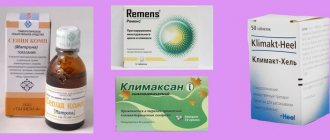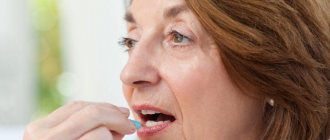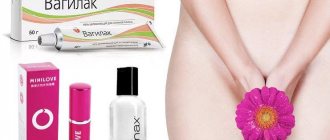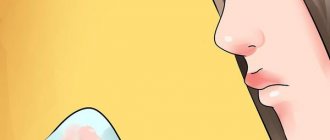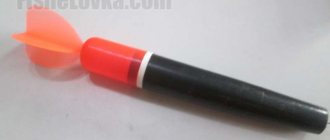The onset of menopause is an inevitable, natural moment in the life of every woman, during which the functioning of the ovaries gradually fades away and the possibility of conception disappears.
Hormonal changes that occur in a woman’s body are often accompanied by many unpleasant symptoms, some of which are quite difficult to tolerate.
One such symptom is vaginal dryness . Therefore, intimate hygiene during menopause performs two tasks - ensuring cleanliness and relieving discomfort.
Creams, gels and lubricants for moisturizing the intimate area during menopause
Discomfort in the genital area and a feeling of dryness on the surfaces of the mucous membranes of the intimate area are the most common manifestations of the menopause.
Many women make the huge mistake of trying to come to terms with the natural transition of age and all the symptoms that come with it. This should not be done, since vaginal dryness not only contributes to difficulty in sexual life and decreased sexual activity, but also sharply reduces the overall level of the immune defense system, which increases the likelihood of developing serious pathological disorders, both inflammatory and infectious.
In order to avoid serious consequences during menopause, various moisturizers have been developed for women, which simply must be used to normalize the condition of the mucous surfaces of the intimate areas. This can be a gel or cream for the intimate area during menopause, as well as products in the form of suppositories or ointments.
What is menopause?
Menopause is the period from the day of the last monthly menstruation until its cessation within 1 year. During this time period, forms of bleeding variability are possible. Menopause is classified into early stage and postmenopausal stage.
Signs of menopausal adjustment:
- at first the bleeding is heavy, “flooding” for 3–7 days, with a break of a week, then they begin again (in one month);
- absence of discharge for 2-3 months or scanty bleeding.
Such symptoms are caused by the transition of the female body to a new physiological homeostasis - menopause (menopause).
Rules of application
Before using any non-hormonal medicine for dry mucous membranes, you must first consult with a specialist, and then, based on his recommendations, select a more suitable remedy for treatment.
Among other things, you must not forget about the rules of personal hygiene and the correct selection of products for such procedures. Let's take a closer look at the causes of this disease, how to choose the right product for hygiene and moisturizing the vaginal area, and a list of creams and lubricants for menopause.
Causes of vaginal dryness
Throughout the life of women before the onset of menopause, such important processes as the production of special lubricant by the vaginal epithelium and cervix occur in their body from the reproductive system of organs.
The mucous fluid produced by the female reproductive system is necessary to eliminate dryness in the intimate area, protect against pathogens and provide a comfortable feeling in the vaginal area. The processes of production and secretion of vaginal lubrication are directly affected by the level of estrogen.
With the onset of menopause, hormonal changes begin to occur in a woman’s body, leading to a decrease in estrogen levels, which helps to reduce the secretion processes of the epithelium and cervix, which in turn leads to the formation of dryness, and then to itching or burning.
Menopause is considered a natural process that occurs in the body of every representative of the fair half of humanity. But despite this factor, it is not worth tolerating all its manifestations without doing anything. After all, the discomfort that occurs with the formation of dryness on mucous surfaces in the intimate area during menopause can occur not only during sexual intercourse, but also at rest. This can cause consequences such as:
- injury to the mucous surface with the appearance of microcracks;
- development of candidiasis;
- the formation of other pathological processes of an infectious nature, leading to injury to neighboring organs and tissues.
Therefore, to eliminate unpleasant symptoms and eliminate the possible consequences of vaginal dryness, it is necessary to use medications with a moisturizing spectrum of action.
Popular creams
Menopausal lubricant cream Vagilak is included in the category of therapeutic gerontological-menopausal drugs for acute manifestations of painful symptoms of menopause. It is prescribed for particularly severe syndrome of dryness of the intimate area (incessant itching of the vestibule of the vagina, when cracks appear in the perineal area). Quickly relieves hyperemia of the vaginal epithelial layer and exhibits analgesic properties.
The targeted effect of Divigel moisturizing cream is a compensatory effect on hormonal imbalance in the female body. The cream is simply necessary for menopause. Because it perfectly moisturizes the vaginal mucous surface, equalizes and maintains the quantitative content of estrogen in normal parameters, and compensates for the age-related deficiency of these important hormones of youth.
Subject to methodical hygiene, under the supervision of a doctor, specialized menopausal creams “Vagilak” and “Divigel” effectively eliminate manifestations of dryness in the intimate area. The drugs are synthetic-hormonal, but with excellent positive therapeutic results.
How to choose the right hygiene and moisturizer?
When purchasing moisturizers for hygienic care of the vaginal area during menopause, you need to pay close attention to what the product consists of and what active components are included in its composition. It should contain:
- the optimal amount of lactic acid, which helps maintain an optimal level of microflora balance;
- content of medicinal plant extracts, D-panthenol and sea buckthorn oil;
- the presence of a large amount of fat;
- the acidity level should be neutral;
- vitamin E and antibacterial component.
Moreover, intimate hygiene products should not contain any aromatic components or fragrances. Soap for menopause in women must be in liquid form, so that all the polymer compounds included in the composition can be easily washed off, and this hygienic procedure does not cause any irritation.
A cream for dryness in intimate areas should not contain various dyes. For women with a high level of sensitivity of the skin and mucous membranes, it is recommended to choose vaginal hygiene and moisturizing products containing aloe vera extract.
Moisturizing gels for vaginal dryness
On the shelves of the modern pharmacological market there is a huge number of moisturizing preparations to eliminate dryness in the intimate areas of menopausal women.
Each drug has its own characteristics and indications for use. Moreover, the pricing policy of various products designed to care for the intimate area varies depending on the quality and manufacturers. Let's consider the most popular moisturizing preparations necessary for intimate hygiene procedures during menopause:
- Gel intended for intimate hygiene procedures “Bliss” , consisting of oil-based extracts of medicinal plants, germaben, glycerin and other excipients. It has a gentle and gentle effect on the mucous surfaces of the intimate area, helping to restore and protect damaged areas. It also activates the natural processes of secretion of natural lubricant and its release. The cost of the drug varies between 160-180 rubles.
- Gel "Vagilak" containing lactic acid as the main active substance. The gel has a moisturizing effect on the intimate area, helps with dryness of the vaginal mucous membranes, eliminating all pain symptoms, increasing the quality of life of a woman, especially her sexual side. The cost of this product can reach 680 rubles.
- “Lactacid” is a gel that contains lactic acid and helps support the natural acidic environment of the woman’s reproductive system, which affects the natural growth of lactobacilli and strengthens the body’s protective properties. It is completely hypoallergenic and does not cause irritation. The price of this drug reaches 250 rubles.
- "Divigel" is an estrogen-containing drug used for severe dryness of the vaginal mucous membranes. Promotes a compensatory effect on estrogen deficiency and eliminates dryness. Prescribed only after consultation with a specialist. The cost of the drug can reach 650 rubles.
Soap and lubricants
Soap “Lanolin”, “Ginseng”, “From peach pits”, “Children’s” in liquid consistency, soft cream soap “Dove”, “Avene” - use no more than 2-3 times a day, in the form of generous washing. You can treat the labia with a disposable damp (sterile) wipe after each urination, adding additional liquid soap to it.
Gel lubricants are gaining demand among pharmacy customers in the department of hygiene products for intimate care during menopause. The following have an excellent moisturizing effect: combinatorial synthetic/homeopathic preparations - “Bliss” (the main substance is tea tree oil extract), “Lactacid”, hygienic conditioners-creams-lubricants, which include trade trends (popular brands) “Paul Mitchel”, “ Aveda."
Due to the fact that Lactacid contains lactose and lactic acid, the product supports the synthesis of biofluids in the intercellular matrix of vaginal cells. The immune defenses of the fading female body are activated during the period of menopause-restructuring. A feeling of abundant moisture is created, the mucous membrane is perfectly nourished with the additional vitamin composition of healing plant components (extract of fir, aloe, germabena flowers and chamomile).
Cream-based moisturizers
During menopause, all representatives of the fair sex are recommended to use not only intimate care products for the genitals, but also regularly use specialized ointments or creams to constantly moisturize the surfaces of the intimate area. It is better to purchase such drugs after consultation with a specialist.
To stimulate the natural processes of producing natural lubrication, many doctors recommend using cream-based preparations containing synthetic hormones. The following drugs help eliminate unpleasant symptoms in the genital area:
- "Vagilak" . This drug contains lactic acid, which helps restore the optimal level of lactobacilli, improve vaginal microflora, eliminate dryness and prevent the development of dysbacteriosis. Also, Vagilak cream helps to increase the elasticity of mucous membranes, regenerate damaged areas and improve the sexual side of a woman’s life.
- Cream for moisturizing the mucous membranes of the vagina "Vagizil" . The creamy texture of this drug helps to moisturize, soften and relieve irritation in the delicate areas of a woman’s intimate area. Prevents the occurrence of unpleasant odors from the vagina and helps restore the elasticity of the tissues of the genital organs.
- "Feminel" is a cream containing lactic acid in its main composition. Helps relieve irritation, eliminate dryness and all resulting unpleasant symptoms. It has a delicate texture and does not remain on clothes after use.
To achieve the desired results from the use of moisturizing creams, gels, or ointments, you must use them correctly and follow the necessary rules of personal hygiene.
Let's take a closer look at how to use intimate care products for the condition of the mucous surfaces of the reproductive system.
Drug treatment
The most common treatment for vaginal dryness is the use of moisturizing vaginal gels - lubricants.
They have not only a moisturizing, but also a lubricating effect. Therefore, they allow the lady to have an active sex life.
Moisturizing gels
What to do to prevent sexual intercourse from causing pain? To do this you need to use lubricants.
Let's consider which moisturizing gels have a moisturizing and lubricating effect during menopause:
- Gynocomfort is a moisturizing gel containing: panthenol, bisabolol, mallow and chamomile extracts. It eliminates the manifestations of dryness, has an anti-inflammatory effect, and also promotes rapid regeneration of damaged areas of the mucosa. Gel treatment will remove burning, itching and discomfort, as well as eliminate cracks that have appeared.
- Ginofit gel is a moisturizing gel based on glycerin and hydroxyethylcellulose. Eliminates the feeling of dryness and burning in the vagina. Used before sexual intercourse.
- Montavit gel is a product containing hydroskeethylcellulose. Effectively replaces natural mucus and is used before sexual intercourse.
Hormonal gels
How to get rid of dryness when the vaginal mucosa is very weakened? In this case, hormonal gels will help get rid of the symptom. They are very effective, because they contain the hormone estrogen, and it was its deficiency that provoked the problem.
The following hormonal agents can be distinguished:
- Dermestril – contains the hormone estriol. Treatment with this remedy will allow the woman to quickly tone the vagina and its mucous membrane. The gel relieves discomfort and stimulates hydration.
- Divigel - the product includes estriol in its composition. The gel effectively restores the mucous membrane, promotes its hydration and relieves all manifestations of discomfort.
- Ovestin - the unique composition of the hormonal drug allows it to have a comprehensive effect on weakened mucous membranes. The drug contains estriol, chlorhexidine and lactic acid. The use of the gel leads to disinfection of the mucous membrane and its rapid regeneration. Symptoms such as itching, burning and discomfort are effectively eliminated.
Treatment with hormonal gels involves daily injection of the product into the vagina before bed. The standard course of treatment lasts a month. After this, the dosage is reduced - the gel is used 2 times a week.
Creams
If treatment with moisturizing gels does not produce results, the doctor will prescribe the lady a cream for dryness in the intimate area. Since creams are hormonal drugs, they should be prescribed exclusively by a doctor.
Some ladies call such creams ointments - this is not true, but the pharmacy will understand what exactly the visitor needs. Which drugs from this group are the most effective?
We offer a list of popular creams:
- Feminel - cream contains milk proteins and Shea butter. It relieves existing vaginal irritation well.
- Vagizil cream not only moisturizes the mucous membranes, but also creates a protective film that prevents irritation.
- Vagilak is a moisturizing cream that increases the elasticity of mucous membranes.
Vaginal suppositories
How to get rid of dryness and at the same time restore the structure of the mucous membranes? You need to use vaginal suppositories for dryness.
The following candles are popular during menopause:
- Estriol is a hormonal suppository that not only removes the symptom, but restores the vaginal microflora.
- Ovestin is a hormonal suppository that treats microcracks and eliminates dryness of the vaginal mucosa.
- Klimaktol-Antikan are non-hormonal suppositories that eliminate discomfort associated with itching and burning, relieve inflammation, and also restore the structure of the vaginal mucosa.
As you can see, you can get rid of vaginal dryness with the help of various medications. Only a doctor can select the optimal medicine in each specific case.
Vaginal dryness is one of the symptoms of menopause that every woman faces. Some ladies tolerate it, while others begin treatment. It is right to be in the place of the second category of women.
Modern medicine can offer female representatives different treatment options for dry intimate areas. You should entrust your health to the hands of specialists, and not self-medicate. We wish you good health!
Dear ladies, share your experience in treating vaginal dryness.
Technique for using moisturizers
During menopause and after menopause, women need to carefully monitor the hygienic condition of the genitals. You should wash yourself at least twice a day. Moisturizing preparations are recommended to be used on a daily basis, which can be applied after taking any water procedure (bath, swimming pool, sauna or shower). The cream must be applied according to the following scheme:
- Initially, hygienic treatment of the external genitalia is carried out using neutral liquid-based soap.
- It is recommended to wash the genitals either with running clean water, and if this is not possible, then it is better to use chilled boiled water.
- After washing, you must dry your hands thoroughly.
- Then squeeze a small amount of cream onto the palm of your dominant hand and spread evenly over the entire surface of the vagina and using the tip of the tube with cream, place a small amount of the drug inside the vagina.
This scheme of using moisturizers will help achieve the desired result very quickly.
It is important to remember that the use of creams containing synthetic hormones is undesirable if a woman has a predisposition to the development of pathologies such as diabetes, cancer, or dysfunction of the cardiovascular system.
All drugs developed to improve the condition of mucous surfaces in the intimate areas of menopausal women do not have obvious side effects. But despite this, before using them, it is necessary to consult with a specialist, since when using the drug in the intimate area, the condition of the mucous membranes may become worse due to individual intolerance to the active components. In such cases, it is necessary to select a different treatment regimen and a drug that includes only extracts of medicinal plants.
Interesting video on this topic:
Moisturizers
Well-known therapeutic and hygienic creams “Nivea”, “Cetaphil”, “CeraVe” have an intense effect. But these are not cosmetic creams used for makeup, these are products for sanitizing the intimate area of the female body, they are sold in pharmacies. A very inexpensive vaseline cream with abundant moisture - “Aquaphor” - effectively helps maintain the state of lubrication in the genitals.
In cases of diagnosing a complicated clinical picture of menopause, concerning the reactive-aggressive manifestation of vaginal dryness (spasmodic contractions, pain), medicinal gel suspensions or vaginal suppositories are prescribed. These are menopausal drugs with a pronounced anti-inflammatory, analgesic characteristic, these include “Vagilak”, “Divigel”.
Causes of itching during menopause
All changes in the body of women during menopause are caused by age-related hormonal changes. For example, recent research suggests that high levels of follicle-stimulating hormone (FSH) during menopause reduce bone density and increase the risk of postmenopausal osteoporosis.
And the causes of itching during menopause are age-related involution of the ovaries, which is expressed in a decrease and then complete cessation of steroidogenesis, that is, the production of estradiol, estriol and estrone. Among the many physiological functions of these sex hormones, gynecologists note not only their effect on tissue estrogen receptors in the uterus, mammary glands and genitals of women of childbearing age, but also stimulation of the formation of cells of the vaginal mucous epithelium and ensuring the production of mucus - to maintain the necessary humidity and pH level.
What happens during hypoestrogenism, which occurs naturally during menopause? Blood circulation in the tissues of the vagina and all organs of the genitourinary system slows down, which leads to a deterioration in tissue trophism; The pH of the vagina shifts to the alkaline side, and its mucous membrane dries out, becomes thinner and partially atrophies. This is the pathogenesis of urogenital atrophy and its symptom such as itching in the intimate area during menopause.
In addition, among the hormonal features of menopause, which ultimately cause itching of the labia during menopause, as well as itching in the vagina during menopause, it is of no small importance that a sharp reduction in the synthesis of estrogen reduces the formation of fibrillar protein of connective tissues and skin collagen, and also reduces the content in blood plasma thyroid hormone thyroxine (T4), iron and copper.
Without regeneration of collagen fibers, tissues lose elasticity; a low level of free T4 leads to a lack of oxygen in all tissues, and with a deficiency of iron and copper in the blood, the condition of bone tissue, vascular walls, skin and mucous epithelium worsens. In particular, this reduces skin moisture, impairs the function of its sebaceous glands and provokes skin itching during menopause.
What is menopause
Climax occurs in several stages:
- premenopause _ Lasts approximately 5-6 years until menstruation completely stops. During this period, the “first bells” come in the form of an increase in the duration of the cycle, hot flashes, and sudden changes in mood. At this stage, vaginal lubrication production begins to decline;
- menopause _ It begins from the moment of complete cessation of menstruation. The functions of the ovaries completely fade. This phase lasts approximately 12 months. All symptoms characteristic of the first phase intensify. There is a high risk of developing serious diseases: osteoporosis, heart failure, diabetes;
- postmenopause . This term refers to the period after menopause and until the end of a woman’s life. During this period, hormonal levels stabilize, so the woman’s well-being improves. Hot flashes disappear, the emotional background normalizes.
Symptoms of itching during menopause
The first signs of itching are that extremely unpleasant sensory sensations - numbness, crawling and tingling - cause an unbearable desire to get rid of them by scratching the itchy area. And in this, the symptoms of itching during menopause are no different from the symptoms of itching of any other etiology.
According to women in this age category, itching in the genital area, in particular, itching of the labia during menopause, as well as skin itching during menopause, often begins to bother them immediately after washing in the bath or taking a shower.
While vaginal itching during menopause most often begins after urination, during and after coitus. In addition to itching, patients usually complain of burning, pain during sexual intercourse (dyspareunia) and painful urination.
The most characteristic consequences of menopausal itching are persistent hyperemia and scratching, up to the appearance of eroded areas of the skin and mucous membranes. And complications occur in case of infection with pathogenic microorganisms and the development of inflammation. After all, vaginal dryness and a decrease in its acidity increase the susceptibility of the mucous membrane to infection.
[6], [7], [8]
Using lubricants during menopause
And why does it contain a lot of flavorings, and even more so dye. There are a lot of manufacturers, the main thing is to find one that is suitable in particular for such a period as menopause. For opponents of drug intervention, after ruling out serious diseases and lack of hormones, herbal medicine will come to the rescue. During menopause, the ovaries gradually lose their functions, so the level of female hormones decreases significantly.
True, in some cases there is an addiction to hormonal lubricants and at the end of use their effect is reduced to zero. The main cause of dryness is hormonal imbalance. For local treatment, you can select gels, creams, lubricants, and modern medicine and pharmaceuticals represent a wide range of them.
Lubricants
Folk remedies help improve the health of the mucous membrane and prevent its dryness. There are also special substances for women, called lubricants, which are designed to alleviate the unpleasant sensations of intimacy during menopause by wetting the vagina and mitigating friction on it during sexual intercourse. The term "lubricant" literally means "to make smooth, slippery."
In composition they are:
- silicone - they last a long time, are economical to use, but leave stains on the fabric;
- water-based - they are quite cheap, do not enter into chemical reactions with latex, do not leave stains, but dry quickly.
PLEASE NOTE! Oil lubricants were also used in the past, but they were almost abandoned due to the undesirable reaction of their components to latex and difficult to remove stains after use.
Taking into account the functional features, the following types of lubricants are distinguished:
- stimulating - they help increase blood flow, which enhances erection;
- spermicidal or contraceptive - their role is clear from the name; these substances should not be washed off earlier than after 6 hours;
- soothing - serve to heal cracks, wounds, soften irritation of the mucous membrane;
- prolongator gels – help prolong sexual intercourse by reducing the sensitivity of the head;
- protective - create a barrier to infection and prevent injury to the mucous membrane.
So, the advantages of high-quality lubricants are that they:
- moisturize the vagina, helping to glide during intimacy;
- slow down the atrophy of the mucosa;
- restore mucous membranes, heal cracks and wounds;
- improve the quality of sexual intercourse, relieving pain, creating the possibility of prolonging it;
- reduce the risk of allergies to condoms;
- protect against infection and unwanted pregnancy.
Disadvantages of these funds:
- water-based gel can cause thrush due to the glycerin it contains;
- the possibility of an allergy to parabens, relatively safe preservatives used in perfumes and the food industry. Their harm is a controversial topic.
Properties and actions of lubricants
The main task of the lubricant is to moisturize the vagina and preserve the mucous membrane. They are prescribed as part of complex therapy during menopause. The indication for use is a woman’s complaint of dryness, itching and burning in the perineum.
The effect of a lubricant depends on its composition. Common properties for all types of drugs are:
- They increase blood flow to the genitals, which increases sensitivity and awakens libido.
- They soften the vaginal mucosa, “enveloping” it with a protective layer.
- Accelerate regeneration processes during the formation of microcracks caused by drying out of the mucous membrane.
- Eliminate discomfort that develops during active walking or running.
- Helps normalize vaginal microflora without causing vaginal dysbiosis.
Lubricants can be used both daily and during sexual intercourse. The choice of one remedy or another depends on the individual characteristics of the woman’s vaginal mucosa.
A wide selection of moisturizers will allow you to choose the one that will perform its functions to the maximum.
Types of lubricants
Depending on what substance is the basis of the moisturizer, lubricants come in several types:
- Gel-based - created from synthetic substances (silicone), which are supplemented with fragrances and oils. Silicone lubricant quickly spreads over the vaginal area, retains its properties for 5-8 hours, does not leak and leaves virtually no marks on underwear. The disadvantage is the fact that if it is necessary to eliminate it, the rinsing process becomes more complicated. In most cases, you have to wait a day for the lubricant to come out naturally. For some women, this disadvantage is a significant advantage, since there is no need to apply lubricant frequently.
- Water-based - a natural product quickly penetrates the mucous membrane, nourishing and moisturizing it naturally. It does not leave characteristic marks on clothes, as it is completely absorbed by the body. There is minimal risk of developing irritation or an allergic reaction, since all components are natural. Among the disadvantages, there is a rapid absorption process, which requires applying the drug several times during sexual intercourse.
- Fat-based - contain nourishing oils that not only moisturize, but retain a feeling of moisture for a long time. They are not combined with condoms, as they can cause damage to their integrity. They may leave marks on clothing, so they require additional hygiene procedures after use.
Diagnosis of itching during menopause
For a gynecologist, as a rule, there are no special problems with diagnosing this symptom of menopause.
In doubtful cases, blood tests are taken for hormones and for the possible presence of infections causing STDs; a smear from the vagina or cervical canal.
And in any case, differential diagnosis is necessary, since itching during menopause can be either a side effect of certain medications or a symptom of genitourinary tract infections, vaginitis, diabetes, hypothyroidism, dermatoses, a skin allergic reaction to hygiene products or food products, as well as one of the manifestations of vitamin A or D deficiency.
[9], [10], [11], [12], [13], [14], [15], [16]
Treatment of itching during menopause
Drug treatment of itching during menopause primarily uses dermatotropic drugs for topical use.
Ointments containing corticosteroids can be used: Comfoderm (Advantan) with methylprednisolone, Afloderm cream with aclomethasone, and Prednitop (Dermatop) with prednicarbate - it is recommended to use once a day for two to three weeks. Posterisan forte ointment (with hydrocortisone) is used twice a day.
Dimetindene gel (Fenistil) refers to drugs that block H1-histamine receptors; it can be applied to itchy areas up to four to five times a day.
Hormonal intravaginal suppositories Estriol (Ovestin) compensate for estrogen deficiency during menopause: one suppository is inserted into the vagina during the day. This drug is contraindicated for thrombophlebitis of the lower extremities, endometriosis, fibromatosis, any forms of mastopathy and uterine bleeding. Side effects of Estriol suppositories include not only irritation of the vaginal mucosa, but also the development of cholelithiasis with bile stagnation, deep vein thrombosis, acute cerebral circulation disorder and even myocardial infarction.
There are also moisturizing vaginal gels (Gynodek, Replens, Montavit). And for more comfortable sexual intercourse and to prevent itching after it, gynecologists recommend using lubricants that replace the natural lubrication of the vaginal mucosa.
Rosehip seed oil can be used topically; Take capsules with evening primrose oil orally - one or two capsules per day. In addition, you need to take care of the intake of vitamins A, B6, B12, C and E.
Among the remedies that modern homeopathy offers, doctors name such ointments for relieving itching as Cikaderma, Iricar and Calendula.
Traditional treatment
Those who prefer traditional treatment should start by increasing their water intake - up to two liters per day.
It is also recommended to take a decoction of Veronica officinalis and nettle (a tablespoon of herb per 250-300 ml of boiling water) internally - drink during the day, in three doses. Or tea with viburnum berries.
Herbal treatments may include medicinal plants such as elecampane, tricolor violet, red clover, steelhead and burdock (roots). A decoction of St. John's wort, chamomile, string and calendula is recommended for sitz baths for itching in the genital area. And skin itching during menopause helps to calm the infusion of watercress leaves (two tablespoons of herb per half liter of water, drink 130 ml before each meal) or gorse (10 g of herb per glass of boiling water, take a tablespoon three times a day) .
[17], [18]
Ointment for itching in intimate places in women, cream: examples of remedies for burning
Itching and burning in intimate places is not uncommon in women, men, children and adolescents. The discomfort can be barely noticeable and painful, pass quickly or drag on. But in any case, you need to get rid of unpleasant sensations by first establishing the cause. If this is a reaction to sweat, waste, or uncomfortable underwear, the problem is easy to solve, and for diseases of various etiologies, you cannot do without ointments and creams for itching in the intimate area. There are no general recommendations, and the doctor prescribes the drug based on the diagnostic results.
Indications for the use of ointments in the intimate area
The causes of discomfort may be insufficient hygiene, hormonal changes, allergies to internal and external irritants, fungal infections, herpes virus, sexually transmitted diseases, parasites, taking antibiotics, injuries, pathologies of internal organs, neoplasms. Moreover, different factors may manifest themselves in the same way, but require individual therapy. It is necessary to visit a doctor to prescribe medications for itching in intimate places in women and men if additional symptoms are pronounced:
- redness of the mucous membrane;
- burning during urination and during sexual intercourse;
- heavy discharge;
- sour or rotten smell from the genitals;
- the appearance of pimples, blisters, red spots in the perineum.
How to choose the right lubricant?
Women after menopause need to apply products with a hypoallergenic effect, based on natural ingredients. Silicone lubricants last a long time, but require rinsing off after use. Fatty and oily ones cannot be used together with latex products, however, they moisturize the vagina well, nourish the tissues and accelerate their regeneration.
Vaginal dryness is not only a problem for mature women; similar discomfort can also be observed during early menopause, after surgical removal of the ovaries, and hypoestrogenism. In such cases, it is best to use gel-based hormonal lubricants. They contain components without parabens and chemicals, naturally moisturize mucous membranes, do not cause irritation, and maintain a normal pH balance.
If you are allergic to the composition of an intimate product or have contraindications to the use of hormones, you can use water-based lubricants. The gel has a moisturizing effect:
Types of creams for intimate areas
The drugs relieve itching and burning, but have different directions, are suitable for some diseases and contraindicated for others. They can be grouped by purpose.
- Antiseptic. Stop the proliferation of pathogenic microorganisms or completely destroy them. Prescribed for wounds and ulcers.
- Anesthetic. Reduce skin sensitivity, dull pain, relieve burning sensation.
- Antihistamines. They reduce allergic reactions, act quickly, and eliminate discomfort within 20 minutes after application.
- Corticosteroids. These are ointments that relieve itching in dermatological diseases. Their long-term use is undesirable in order to prevent atrophy of the upper layer of the epidermis.
- Calcineurin inhibitors. They are used to relieve inflammation. The drugs have serious side effects and are not intended for long-term use.
Hormonal medications should not be used without a doctor's prescription. Firstly, these ointments quickly relieve itching in the intimate area, but have multiple side effects. Secondly, if treated incorrectly, the situation will worsen, and then more intensive therapy and powerful medications will be needed.
The best anti-itch creams and ointments for intimate areas
There are many external medications to eliminate discomfort. They differ in the direction of action, price, range of side effects and the possibility of use at different ages and conditions. An ointment for itching in intimate places is selected by a gynecologist for women, and a urologist for men. Sexually transmitted infections are treated by a venereologist.
The most common and effective drugs:
To restore vaginal microflora
- Lactacid. The product contains lactic acid, so it copes well with the discomfort caused by vaginal dysbiosis, restores and maintains normal microflora. Lactacid is produced in the form of vaginal cream and gel. The product is safe for pregnant and lactating women and teenagers. With proper use and the absence of allergies to the components of the drug, an improvement in the condition of the genital area is observed:
- swelling and redness subside;
- The labia do not itch.
injured skin is restored;
The drug is recommended for the prevention of dysbacteriosis.
- Vagilak. The main component of the gel is lactic acid, which helps maintain local immunity in the perineum. The product is intended for the treatment and prevention of itching caused by disturbances in the vaginal microflora, eliminates redness, dryness, relieves swelling, and prevents discomfort during sexual intercourse.
- Gynocomfort. The ointment is prescribed after treatment with antibiotics. When the main problem is eliminated, the balance of the ratio of beneficial and harmful bacteria is disrupted, dryness appears in the vagina, and severe itching is felt. The use of Gynocomfort eliminates unpleasant symptoms and restores microflora.
From fungus
- Pimafucin. This is an intimate cream for itching and irritation caused by fungal infections. The active component natamycin suppresses the development and reproduction of pathogenic microorganisms at the initial stage. The cream can be used to relieve discomfort even before visiting a doctor. If the disease is advanced, additional medications are needed.
- Ginofort. The active ingredient in the cream is butoconazole, which inhibits the development of fungi and some gram-positive bacteria.
- Clotrimazole. The cream quickly copes with itching, relieves swelling, and stops heavy discharge in case of fungal infection. Due to the many side effects, the drug can only be used as prescribed by a doctor.
- Nystatin. The ointment effectively and quickly destroys the shell of fungi such as Candida, quickly relieving the symptoms of thrush. The drug is also prescribed during antibiotic treatment.
- Boromenthol. The drug contains menthol, so it quickly cools the problem area and relieves swelling. Use ointment for itching on the labia in women, penis and scrotum in men.
- Actovegin. The cream is prescribed for damage to the mucous membrane and skin in the groin area, or the presence of ulcers. The active component of Actovegin is calf blood; additionally, plant extracts are present, which promotes rapid healing of damaged areas.
To relieve inflammation and allergies
- Gistan. The drug quickly relieves irritation caused by allergies and inflammation. It contains plant components that have a calming effect. This is an antihistamine cream against severe itching in the intimate area, so precise dosage and compliance with the maximum duration of treatment is necessary.
- Vagisil. The cream eliminates irritation from uncomfortable underwear, powder residue on clothes, and the use of allergenic cosmetics. Vagisil can also be found in the form of wet wipes. In addition to the main components laureth and surfactant, the product contains vitamins A, E, D, which support the comfort and health of the genitals.
- Prednisolone. The ointment is effective for non-microbial dermatological lesions. It is prescribed to relieve discomfort in the perineum due to psoriasis, neurodermatitis, and dermatitis. The drug should be applied pointwise, without rubbing into the affected area.
- Levomekol. This is an effective anti-inflammatory, antibacterial and healing drug. Recently it began to be prescribed for thrush. Levomekol is not effective for eliminating yeast-like fungi, but in combination with other drugs it promotes rapid recovery.
- Clindamycin. An effective antibiotic that suppresses the inflammatory process. The cream can be used only as prescribed by a doctor as part of complex therapy.
Treatment methods
Only a doctor should treat dryness, especially if there is burning and itching. Even when a woman plans to use traditional methods, a consultation with a gynecologist is still needed. During menopause, if there is dryness in the intimate area, the doctor prescribes medications containing female hormones. In addition, you need to use various ointments and gels that eliminate other unpleasant symptoms.
Treatment is always local and consists of the use of drugs containing estrogens. It is necessary to use emollients and moisturizers that improve the condition of the vagina.
The doctor prescribes complex treatment with suppositories, creams and lubricants, sometimes using hormonal therapy. For vaginal dryness, it is important to restore hormonal levels and eliminate unpleasant symptoms.
Moisturizing gels
To normalize sex life and eliminate pain during sex, a gel is used to moisturize the intimate area.
Lubricants lubricate and moisturize the vagina, reducing discomfort.
The following gels are often prescribed:
- Montavit - the drug contains hydroxyethylcellulose. The component productively replaces natural lubricant, so it is often used before sex;
- Gynocomfort - contains chamomile extracts, panthenol and other active ingredients. The gel has an anti-inflammatory effect, triggers the regeneration of cells and tissues of the mucous membrane, eliminates drying, burning, itching, cracks;
- Ginofit is a medicine created on the basis of hydroxyethylcellulose and glycerin. Eliminates burning and dryness, used immediately before sexual intercourse.
Before the procedure, you need to wash your hands, wash yourself and apply the gel to the mucous membrane of the vulva, as well as the vaginal opening. It is advisable to use a special applicator to avoid infection.
Hormonal gels
If the vaginal mucosa is too weakened, hormone therapy is prescribed. Hormonal gels help well, as they contain estrogen. It is the regular deficiency of this hormone that leads to dryness during menopause. In cases of imbalance, the following drugs are prescribed:
- Ovestin is a gel with a unique composition that effectively affects weakened mucous membranes. The product contains lactic acid, estriol and chlorhexidine. The components disinfect the perineum and start its regeneration processes. After use, itching, burning and other unpleasant symptoms disappear.
- Dermestril is the main component - the hormone estriol, which tones the vagina and mucous membranes, relieves discomfort and activates optimal hydration.
- Climara - improves blood circulation in the tissues of the vagina and uterus, thereby enhancing the secretory function of the mucous membrane.
- Divigel - the product consists of the hormone estriol, which restores the mucous membrane, moisturizes it and relieves all unpleasant symptoms.
Therapy with hormonal gels involves inserting them into the vagina before bed. The procedures are carried out daily, and after 30 days the dosage is reduced to 1-2 applications per week.
Along with gels, before sex you need to use moisturizing lubricants that will relieve dryness and improve your sex life, which is necessary for good health and youth.
Creams
If gel therapy does not produce results, the doctor prescribes creams to the woman.
Since intimate hygiene cream for menopause is a hormonal drug, only a doctor should choose it.
List of remedies during menopause that relieve dryness:
- Vagilak is a moisturizer that increases the elasticity of the mucous membrane;
- Feminel - includes Shea butter and milk proteins, which perfectly relieve inflammation and irritation in the perineum;
- Vagizil - the product not only has a moisturizing effect, but also forms a special protective film that prevents irritation.
Cream for dryness in the intimate area helps eliminate inflammation, remove irritation, and heal small cracks and wounds.
Some products contain female hormones, therefore, you should consult your gynecologist before use.
Vaginal suppositories
To restore the mucous membrane and eliminate dryness during menopause, it is necessary to use vaginal suppositories.
The following suppositories are usually prescribed:
- Climactol-Antikan is not a hormonal product. Eliminates discomfort and inflammation, and also restores the structure of the mucous membrane.
- Estriol - suppositories contain hormones that relieve symptoms and restore microflora.
- Ovestin is a hormonal suppository that is used to treat microcracks and eliminate dryness.
Some medications have contraindications, so you should visit a doctor before use.
Alternative medicine
In addition to drug therapy, you can use folk remedies, the most popular include:
- Oils and ointments made from natural herbs are used for lubrication. Olive oil and calendula ointment, which are sold in pharmacies, are useful for women. If you use them regularly, tissue rejuvenation and wound healing occurs;
- Herbal treatments – some of them increase estrogen levels, such as chasteberry, ginseng, black cohosh and angelica. They can be found at the pharmacy, but cannot be used together with other medications.
To speed up results, it is important to avoid stress and exercise. Physical exercise stimulates the entire body and helps fight depression.
Sources:
https://vklimakse.ru/krem-dlya-intimnoj-zony.html https://stopclimax.ru/problemy/suhost-vlagalishha https://tvoimesyachnye.ru/klimaks/suhost-v-intimnoj-zone-vo- vremya-climaksa



